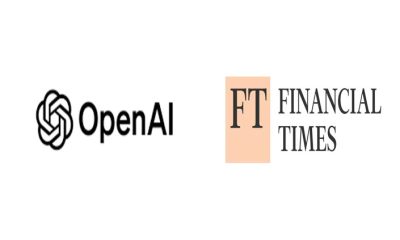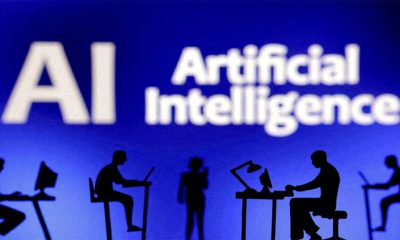A grinding crackdown that wiped billions of dollars of value off Chinese technology companies is easing, but the once-freewheeling industry is bracing for much slower growth ahead.
Analysts say China’s easing of restrictions on companies like e-commerce giant Alibaba and online games company Tencent and talk of support for the private sector reflects Beijing’s decision to refocus on growth after the economy was ravaged by the pandemic and restrictions imposed to fight COVID-19.
But controls on internet content remain firmly in place. And the crackdown has left a “chilling” effect on the industry, potentially slowing innovation, while U.S. restrictions against China’s computer chips industry are hindering progress in developing leading-edge technology in 5G and artificial intelligence.
In January, a top official at China’s central bank said in an interview with state-owned media that the crackdown on technology companies was “basically” over, adding that companies would be encouraged to lead economic growth and create more jobs. That came just weeks after China dropped stringent entry restrictions and testing and quarantine requirements that were part of its “zero-COVID” strategy meant to quash the virus.
“With the end of the zero-COVID policy, China is returning to prioritizing economic growth, and the technology sector is obviously a critical driver of growth in China and a celebrated source of innovation,” said Gregory Allen, a senior fellow in the Strategic Technologies Program at the U.S. research organization Center for Strategic and International Studies.
Companies like Alibaba and Tencent control everyday apps and services that are used ubiquitously by large swathes of the population – including online payments, messaging, food delivery and e-commerce.
Such companies flourished for two decades with scant regulation before Beijing launched a barrage of anti-monopoly, data security and other restrictions in late 2020, seeking to rein in e-commerce, social media and other companies it viewed as too big and independent.
Signalling an easing, Didi Global — which was ordered to stop new-user registrations in 2021 following accusations that it violated data security rules — recently was allowed to resume taking on new users.
Regulators said e-commerce giant Alibaba’s finance affiliate Ant Group can go ahead with plans to raise $1.5 billion for its consumer finance unit, an important step forward after the government called off a planned IPO two years ago and ordered the firm to restructure.
After slamming online games as “spiritual opium” and enforcing strict controls on screen time for minors, regulators last April began approving new games following an eight-month hiatus, with the first foreign titles greenlighted in December.
Stocks of technology companies, including Alibaba, and Tencent, as well as others such as food Delivery Company Meituan and search engine and artificial intelligence firm Baidu, have seen their stock prices nearly double since they hit rock bottom in late October. The market valuations of these companies, however, are still far from their peak in 2019.
The crackdown’s chilling effects for investors and entrepreneurs will linger, Allen said since the authorities have shown they’re willing and able to forego growth to impose controls on the industry at any time.
Over the past two years, several founders of technology companies have stepped down as CEO or chairman of their respective firms – including Alibaba’s Jack Ma, JD.com’s Richard Liu, Bytedance’s Zhang Yiming and Pinduoduo’s Colin Huang.
In January, Alibaba’s financial affiliate Ant Group said that Ma — once China’s richest man — would give up control of the firm following a restructuring and that no single shareholder would have control. Ma has rarely been seen in public since regulators pulled the plug on Ant Group’s market debut in Hong Kong and Shanghai following his criticism of China’s financial sector in 2020. He since reportedly has moved to Tokyo.
“If you were a technology entrepreneur in China five years ago, very likely someone like Jack Ma was your hero, your idol, and was precisely what you aspired to achieve and the sort of person you aspire to become,” said Allen. “And to see a man like that kind of torn down, I think sends a really strong message.”
He and other analysts say the crackdown could potentially stifle innovation, as investors and entrepreneurs become more cautious about operating in China.
“The crackdown was deep and cut far to the bone, probably more than the government expected it to,” said Shaun Rein, founder and managing director of China Market Research Group in Shanghai. “Because what’s happened is over the last two years, venture capitalists and entrepreneurs have been scared to deploy capital and start new companies.”
The value of venture capital deals in China plunged 44% to $62.1 billion in the first 10 months of 2022 compared to the same period in 2021, according to research firm Preqin.
Some entrepreneurs and venture capitalists are taking a wait-and-see attitude, “worried in the long term that if they invest in a hot sector that the government that goes against China’s agenda or doesn’t fit with the government’s agenda for the private sector that they might get wiped out,” Rein said.
Well-established internet companies are still at an advantage over other tech industries in China that face added uncertainty due to friction between Washington and Beijing over advanced technology and trade as the U.S. seeks to block exports of high-end semiconductors and chip-making equipment and limit Western dealings with companies like Huawei Technologies, the world’s largest maker of telecommunications networking gear.
The Biden administration has stopped approving the renewal of licenses to some U.S. companies that have been selling essential components to the Chinese tech giant. That’s according to two people familiar with the matter who was not authorized to comment publicly on the sensitive matter and spoke on the condition of anonymity.
Washington gradually has tightened controls over U.S. exports to Huawei but had allowed some companies like Intel and Qualcomm to sell it processors used in devices like laptops and lower-end smartphones. The U.S. has justified such sanctions on national security grounds. Huawei denies the accusations.
Under such pressure, China has accelerated efforts to become more self-sufficient in semiconductors and other advanced technologies, providing billions in subsidies and investments for the industry. But it remains years behind in some of the most advanced semiconductor manufacturing processes and a U.S. prohibition against supporting the development and production of integrated circuits at some chip factories in China has deprived Chinese chip firms of the foreign talent that has long contributed to its domestic industry.
A U.S. ban on selling crucial semiconductor manufacturing equipment to China is another obstacle.
“It’s one thing to go into areas like software and cloud services, in which Chinese companies are already quite strong,” said Allen of CSIS.
“It’s a very different thing to take Chinese companies that are a decade or two behind in state-of-the-art semiconductor manufacturing equipment and tell them to grow up immediately by replicating some of the most advanced technologies that the world has ever produced.”
Post Views: 83


 Sports3 months ago
Sports3 months ago
 Sports3 months ago
Sports3 months ago
 Fashion2 months ago
Fashion2 months ago
 pakistan3 months ago
pakistan3 months ago
 pakistan3 months ago
pakistan3 months ago
 World2 months ago
World2 months ago
 Sports2 months ago
Sports2 months ago
 World2 months ago
World2 months ago






















